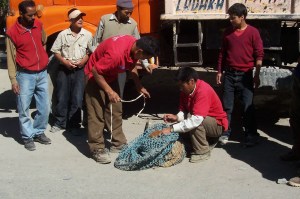First Day in the Field
After resting a day to acclimate myself to the 10,000 feet elevation, I went out with Kunzang, Sonam, and Tsering to capture dogs. Although the Tru Catch (48F) folding dog traps had arrived long before I arrived no one wanted to take them out until they were shown how to use it. I was soon going to learn that they were going to teach me how to use a boxtrap! That first day I went out to merely watch and learn.
Although I have handled over 1,000 dogs they have always been on my terms in my way. It was time I learned how other people caught animals. It is not only different types of equipment, I wish to learn how other cultures influence their actions, how does the public react to them, what are their greatest challenges and needs. It is also important for me to watch to see if they have an inherent desire and dedication for compassionate and respectful handling and if so how do they convey that when handling the dog.

Animal Handlers from Sikkim
Kunzang and his team definately had an inherent care and compassion for the animal. Their primary approach was to use long handled nets and catch dogs who were sleeping. There were several escapes but they were very quick. I could see they can concern about working in front of the public. Chasing dogs with nets and then hearing them yelping as the other pack members are barking and upset makes the public upset and the animal handlers were often scolded even though they were helping their community. It usually does not have to be that way.
I taught Kunzang, Sunam, and Tsering how to scruff a dog and how to muzzle it with a leash. This combination safely and humanely controls the front half of the dog and if it is moved another person can hold the hips for a two person carry. I also taught them how to be calm and use the breath to relax when the animal is tense. The crazier the animal is, the calmer we should be. I explained that animal handlers usualy add far to much excitement and tension and the animals are very sensitive to this and react to it. Throughout my trip as we were handling dogs, I would stop in the middle of a crazy moment of excitement remind them how to watch ourselves and our behaivor and relax so that it will reduce the struggling of the dog and help us better control and guide the situation. As in all things in life what we are being is usually more important than what we are doing. Continue reading
Filed under: Ladakh, India, Ladakhi Animal Care Society, Training, Vets Beyond Borders | Tagged: feral dogs, Global Wildlife Resources, India, spay/neuter programs, Training, Trap Neuter Release | Leave a comment »

